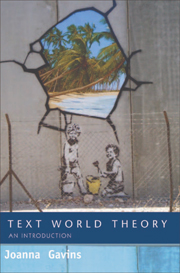4 - Processes
Published online by Cambridge University Press: 05 August 2013
Summary
KEY ISSUES IN THIS CHAPTER
This chapter explores how text-worlds develop in the human mind. Once the spatial and temporal parameters of a text-world have been established by the world-building elements of the discourse, how does that text-world evolve and progress? What kinds of textual features cause a text-world to advance and in what ways? This chapter is particularly concerned with how we conceptualise the actions, events and other processes described in a discourse. The relationships which exist between these discourse elements and the background of world-builders against which they take place are also explored. Three different reports of a football match taken from three contrasting sources are examined here in order to demonstrate the basic mechanics by which text-worlds evolve. These analyses also investigate how the manner in which an action is described in the discourse-world can affect the participants' perception of the relationships between enactors in the text-world. The range of possible language choices available to the reports' varying speakers and writers are compared and the effects of their final selections on the overall texture of the text-world are discussed. This chapter also explores how the text-worlds related to different genres of discourse advance in distinct ways.
- Type
- Chapter
- Information
- Text World TheoryAn Introduction, pp. 53 - 72Publisher: Edinburgh University PressPrint publication year: 2007



